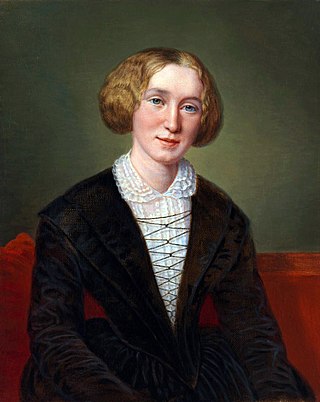
Mary Ann Evans, known by her pen name George Eliot, was an English novelist, poet, journalist, translator, and one of the leading writers of the Victorian era. She wrote seven novels: Adam Bede (1859), The Mill on the Floss (1860), Silas Marner (1861), Romola (1862–1863), Felix Holt, the Radical (1866), Middlemarch (1871–1872) and Daniel Deronda (1876). As with Charles Dickens and Thomas Hardy, she emerged from provincial England; most of her works are set there. Her works are known for their realism, psychological insight, sense of place and detailed depiction of the countryside. Middlemarch was described by the novelist Virginia Woolf as "one of the few English novels written for grown-up people" and by Martin Amis and Julian Barnes as the greatest novel in the English language.

Ann Radcliffe was an English novelist and a pioneer of Gothic fiction. Her technique of explaining apparently supernatural elements in her novels has been credited with gaining respectability for Gothic fiction in the 1790s. Radcliffe was the most popular writer of her day and almost universally admired; contemporary critics called her the mighty enchantress and the Shakespeare of romance-writers, and her popularity continued through the 19th century. Interest in Radcliffe and her work has revived in the early 21st century, with the publication of three biographies.

James Payn was an English novelist and editor. Among the periodicals he edited were Chambers's Journal in Edinburgh and the Cornhill Magazine in London.
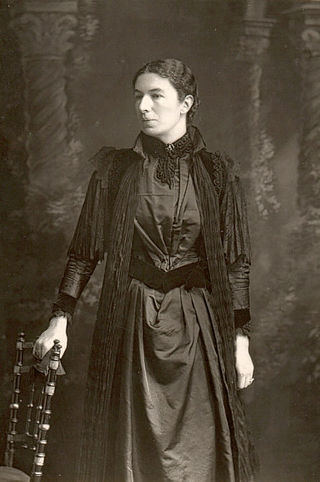
Mary Augusta Ward was a British novelist who wrote under her married name as Mrs Humphry Ward. She worked to improve education for the poor setting up a Settlement in London and in 1908 she became the founding President of the Women's National Anti-Suffrage League.

Antonio Fogazzaro was an Italian novelist and proponent of Liberal Catholicism. He was nominated for the Nobel Prize in Literature seven times.

St. George Jackson Mivart was an English biologist. He is famous for starting as an ardent believer in natural selection and later becoming one of its fiercest critics. Mivart attempted to reconcile the theory of evolution as propounded by Charles Darwin with the beliefs of the Catholic Church but was condemned by both Darwin and the Church. His belief in a soul created by God and insistence that evolutionism was not incompatible with the existence of such a God brought him into conflict with other evolutionists, while his theological theories on hell and on the compatibility between science and Catholicism led him to clash with the Church.
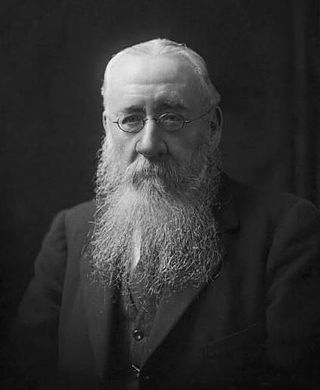
George Edward Bateman Saintsbury, FBA, was an English critic, literary historian, editor, teacher, and wine connoisseur. He is regarded as a highly influential critic of the late 19th and early 20th century.

Louis Émile Clément Georges Bernanos was a French author, and a soldier in World War I. A Catholic with monarchist leanings, he was critical of elitist thought and was opposed to what he identified as defeatism. He believed this had led to France's defeat and eventual occupation by Germany in 1940 during World War II. His two best-known novels Sous le soleil de Satan (1926) and the Journal d'un curé de campagne (1936) both revolve around a parish priest who combats evil and despair in the world. Most of his novels have been translated into English and frequently published in both Great Britain and the United States.

Margaret Oliphant Wilson Oliphant was a Scottish novelist and historical writer, who usually wrote as Mrs. Oliphant. Her fictional works cover "domestic realism, the historical novel and tales of the supernatural".
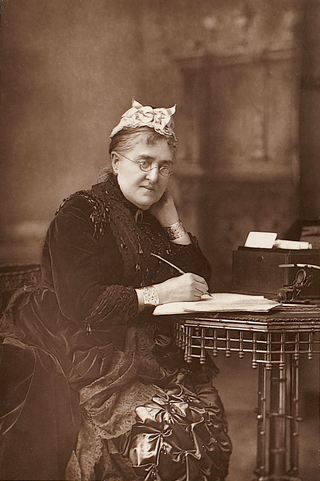
Eliza Lynn Linton was the first female salaried journalist in Britain and the author of over 20 novels. Despite her path-breaking role as an independent woman, many of her essays took a strong anti-feminist slant.
This is a chronological bibliography of books and a general bibliography of articles by the author Hilaire Belloc. His books of verse went through many different editions, and are not comprehensively covered.

Robert Ward, or from 1828 Robert Plumer Ward, was an English barrister, politician, and novelist. George Canning said that his law books were as pleasant as novels, and his novels as dull as law books.

William Hurrell Mallock was an English novelist and economics writer. Much of his writing is in support of the Roman Catholic Church and in opposition to positivist philosophy and socialism.

Mary Anne Sadlier was an Irish author. Sadlier published roughly twenty-three novels and numerous stories. She wrote for Irish immigrants in both the United States and Canada, encouraging them to attend mass and retain the Catholic faith. In so doing, Sadlier also addressed the related themes of anti-Catholicism, the Irish Famine, emigration, and domestic work. Her writings and translations are often found under the name Mrs. J. Sadlier. Earlier in her career, from 1840 to 1845, some of her works were published under the name "Anne Flinders".

Robert Elsmere is a novel by Mrs. Humphry Ward published in 1888. It was immediately successful, quickly selling over a million copies and gaining the admiration of Henry James.
Elizabeth Burgoyne Corbett (1846–1930), also known as Mrs George Corbett, was an English feminist writer, best known for her novel New Amazonia: A Foretaste of the Future (1889).
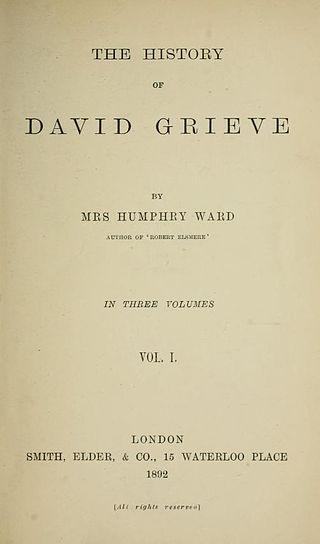
The History of David Grieve is a novel by Mary Augusta Ward, first published in 1892. Set in the 1860s and 1870s, the author follows the life of its titular character through four distinct parts: childhood, youth, storm and stress. The book begins with David's youth in rural Derbyshire goes on to his time as a bookseller in Manchester, his experiences and love affair in Paris, and his eventual return to Manchester as a married man. David's sister Louie is a central character.

Marcella is a novel by Mary Augusta Ward, first published in 1894.

Sir George Tressady is a novel by Mary Augusta Ward. Originally published as a serial from 1895 to 1896, it was Ward's seventh novel.
Josephine Mary Ward was a British novelist and nonfiction writer whose works were informed by her Roman Catholic faith. She published ten novels and a novella, including One Poor Scruple (1899), Out of Due Time (1906), The Job Secretary (1911) and Tudor Sunset (1932). Her novels were generally well received during her lifetime, but fell into obscurity after her death. Some of her fiction has been reprinted in the 21st century. She also wrote articles and religious tracts, and edited her husband Wilfrid Ward's lectures for publication. She provided the initial finance for the Catholic publishing house Sheed and Ward, founded by her daughter Maisie Ward and her husband.

















